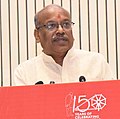| Branch of Government of India | |
 Ministry of Electronics & Information Technology | |
 | |
| Ministry overview | |
|---|---|
| Formed | 5 July 2016 |
| Preceding Ministry | |
| Jurisdiction | Government of India |
| Headquarters | Sanchar Bhawan New Delhi 28°37′18″N77°12′50″E / 28.62167°N 77.21389°E |
| Annual budget | ₹16,549 crore (US$2.0 billion) (2023-24 est.) [1] |
| Ministers responsible |
|
| Ministry executive |
|
| Website | meity एमईआईटीवाई |
The Ministry of Electronics and Information Technology (MEITy) is an executive agency of the Union Government of the Republic of India. It was carved out of the Ministry of Communications and Information Technology on 19 July 2016 as a standalone ministerial agency responsible for IT policy, strategy and development of the electronics industry. Under the sponsorship of the Ministry of Electronics and Information Technology, the "Northeast Heritage" Web, owned by the Government of India, publishes information on Northeast India, in 5 Indian languages, Assamese, Meitei (Manipuri), Bodo, Khasi and Mizo, in addition to Hindi and English. [3]







